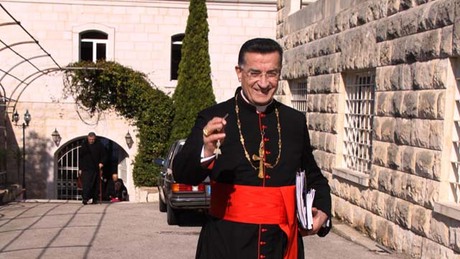A Political Visit Par Excellence

Sami Kleib
As-Safir, 11-02-2012
Syrian President, Bashar Assad, personally took care of the visit of Maronite Patriarch, Cardinal Mar Beshara Boutros Rahi. He was keen on guaranteeing impeccable graphic security measures, since his departure from his very seat in Lebanon, until his arrival in Syria. Both Syrian and Lebanese security officials carried out necessary contacts to secure a safe trip, something that the General Security Chief, Brigadier General Abbas Ibrahim, can confirm.
 There is a good relation between Assad and Rahi, nay amicability. And today, both men share at least two concerns: the first is related to "Jihad" and the ever-expanding hardline Islamism in the region; and the second is directly linked to the situation of Christians in Syria. Accordingly, freshly exchanged letters between Assad and the Vatican on how to protect Christians are worth-mentioning. General Michel Aoun, MP Suleiman Franjieh, and former Deputy Speaker Elie Ferzli know some of these letters' content.
There is a good relation between Assad and Rahi, nay amicability. And today, both men share at least two concerns: the first is related to "Jihad" and the ever-expanding hardline Islamism in the region; and the second is directly linked to the situation of Christians in Syria. Accordingly, freshly exchanged letters between Assad and the Vatican on how to protect Christians are worth-mentioning. General Michel Aoun, MP Suleiman Franjieh, and former Deputy Speaker Elie Ferzli know some of these letters' content.
The preparations for the Maronite Patriarch's visit were made in complete secrecy. Syrian ecclesiastical milieus even point at an exchange of messages. The bottom line is that Assad greatly welcomes His Beatitude. If the Patriarch asked for a meeting with him, his doors would have been widely open. If he didn't, Damascus would still appreciate and understand the pastoral aspect of the visit and the embarrassment such a meeting would produce.
Furthermore, it would have been also reasonable if the meeting took place away from the limelight. All this is important; but the most salient is Damascus visit per se.
Rahi was cordial during the prep contacts and communications. He is supportive for what the Syrian authorities are doing "to curb the expansion of Jihadism and al-Qaeda." He is as well concerned with the Islamists' grip of power in the countries that witnessed uprisings and revolutions. Rahi highly esteems the Syrian official keenness on protecting Christians as much as possible, and he is content President Assad is personally keen on Christians.
For the past two years, the Syrian authorities did not fail to answer the requests of the Church. They bore the brunt to facilitate the movement of priests and the ecclesiastical personnel. They also released every person, whether apprehended mistakenly or for invalid reasons, the Church has asked to free.
Rahi had a major contribution to convey clear-cut messages to the West. Behind the closed doors in many European and foreign capitals, he broached a huge mistake in entrenching the presence of hardline Islamism at the account of the Christians of the East. More than once, he said a secular regime in Syria that is open to Christians and other sects was way better that any impending regime with a totalitarian dimension. He also gave examples on what happened or what was taking place in some Arab countries. He even criticized some claims on democracies while he did not believe in any, and slammed any foreign interference to impose a de facto state by foreign sides. Moreover, he laid open the necessity to preserve diversity in the region between Christians and Muslims.
About two years ago, the Vatican pressed for the election of Rahi on top of the Maronite Patriarchate because it wanted him to walk that very path. The ecclesiastical authorities in Rome were very much impressed by the Prelate of Bkirki. For his part, President Assad has given the green light to the Syrian envoy to Lebanon, Ali Abdul Karim Ali, to maintain cordiality with Cardinal Rahi and meet his demands. In turn, Rahi has just been as affable and grateful.
When Rahi arrived in Damascus, the Syrian authorities had set it all for a convenient welcoming. The traded contacts, which some remained unrevealed, only confirmed the two-pronged amicability.
Many personalities were sent to the enthronement which the Patriarch patronized, on top of whom Syrian Minister of Waqf, Mohammad Abdul Sattar. This also affected the strained relations between Lebanese President, Michel Suleiman, and Assad. In fact, Suleiman told some of his itinerants that contact with Assad has become more cordial that any time before.
Today, Rahi enjoys a special standing among the Syrian command, that is flatly different from that of his predecessor, Cardinal Nasrallah Sfeir, who had over and over refused to go to Damascus. Rahi is even more special than President Suleiman and Prime Minister Najib Mikati.
In Damascus, he countered the utmost cordiality with an excellent political speech. With his admirable eloquent Arabic language, he just knew how to speak his stance out in a nutshell. The prelate, very well versed in politics, said, "The so-called reforms and democracies do not equal one drop of blood of an innocent man." He said he came united in solidarity. And when the new Patriarch John X Yazigi delivered his speech, he addressed President Assad and thanked him. Rahi, in line with the entire panel of attendees, were seen applauding thrillingly.
When Assad was asked about the Patriarch he favored, during the election of the new Greek Orthodox Prelate, he said, "We do not want to meddle in this ecclesiastical pastoral affair; all what we want is a Syrian Patriarch."
The visit of the Maronite Patriarch per se is a political event par excellence. Rahi knows this, and so does Damascus. Both sides may have wanted this religious-political step to be a blatant message amid a critical time of a Russian-US rapprochement and upped demands by the Syrian opposition for dialogue with the regime.
Isn't it sheer naiveté to say the visit was merely pastoral?!
Comments




